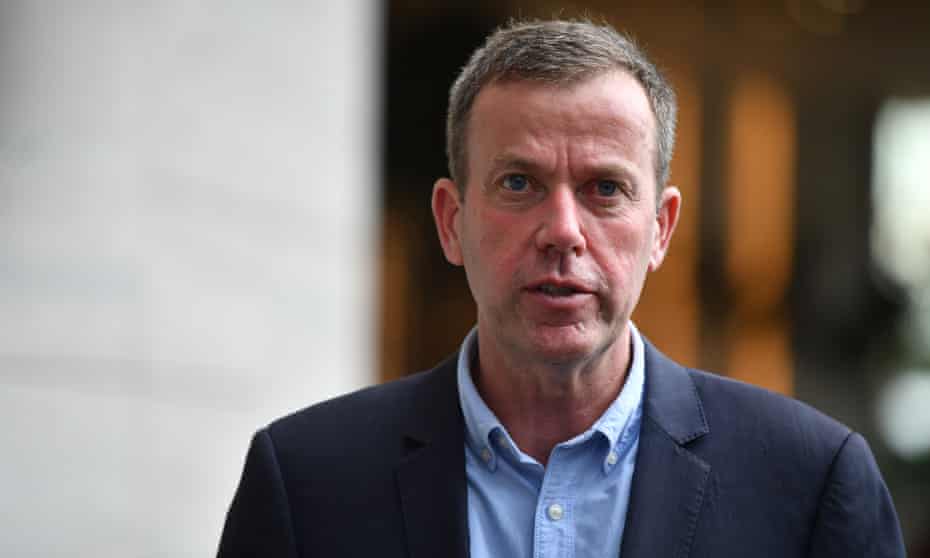‘We have to be at the table’: Australia’s trade minister urges colleagues to back net zero to protect trade
Dan Tehan says he has spoken with government MPs about the risks to key industries from ‘protectionist forces’ in some countries

Last modified on Thu 21 Oct 2021 12.31 EDT
The trade minister, Dan Tehan, has urged his government colleagues to back net zero emissions by 2050, declaring “the world is moving to decarbonise” and Australia must be at the table to fend off “protectionist forces”.
With the Morrison government attempting to reach a deal over climate policy as the Glasgow conference looms, Tehan revealed he had spoken with colleagues about the risks Australia faced if it failed to spell out a clear plan to net zero.
“There is no doubt that when I’ve been in Japan, South Korea, Vietnam, Singapore, the US or Europe, the world is moving to decarbonise,” Tehan said in an interview with Guardian Australia.
“The conversations that I have in all those places is about how we can do that, while protecting our key industries and growing our economies.”
The Australian government continues to oppose carbon border tariffs, which have been proposed by the European Union and are set to be considered by other countries such as the US and the UK.
But Tehan’s message to colleagues within the Australian government is that committing to net zero will allow it to be “at the table” to influence international discussions. “We have to be at the table fighting that approach,” he said.
Asked to elaborate on the consequences of Australia not signing up to net zero, Tehan said: “The risks are that countries will use it as a means to drive a protectionist agenda and use tariffs as potential means to try to drive change, which I think will be incredibly counterproductive and really just bring to the fore protectionist forces.”
Tehan said he had always taken the view that climate change was a global problem that required a global approach.
He reaffirmed his previous calls for countries to reduce tariffs on environmental goods and services, “so that all countries can benefit from the technology and the knowhow as to how we’re going to reduce emissions”.
“That’s the positive approach that Australia thinks we should take,” he said.
“My concern is if we’re not at the table, signing up to net zero by 2050, then we’re not there making sure that this is going to be done the right way and that those protectionist forces can’t disrupt the approach that we think should be taken to addressing emissions reductions.”
Tehan, the Liberal MP for the regional Victorian seat of Wannon, confirmed he had “made that argument directly to colleagues”.
Quick GuideHow to get the latest news from Guardian AustraliaShow

Email: sign up for our daily morning briefing newsletter
App: download the free app and never miss the biggest stories, or get our weekend edition for a curated selection of the week’s best stories
Social: follow us on YouTube, Facebook, Instagram, Twitter or TikTok
Podcast: listen to our daily episodes on Apple Podcasts, Spotify or search “Full Story” in your favourite app
He also said Australia wanted to “work cooperatively with the large agricultural subsidisers, especially the EU and the US, at the World Trade Organization” to start to address agricultural subsidies.
Tehan’s comments follow a warning from the National Farmers’ Federation that a failure to embrace net zero could “punish farmers” as the rest of the world decarbonises, partly because of the risk of carbon border adjustment charges.
The trade minister stopped short of backing a strengthening of Australia’s 2030 target, which is currently set at the Abbott-era pledge of a 26% to 28% cut in emissions on 2005 levels, repeating the government’s line that it would meet and beat it.
“I think what we need to be able to do is demonstrate that we’ve got a clear plan to get to net zero by 2050,” he said.
Bridget McKenzie, a cabinet minister who leads the Nationals in the Senate, warned on Wednesday it could get “ugly” if the prime minister, Scott Morrison, committed to net zero without the explicit support of the junior Coalition party.
While senior Liberals and Nationals are increasingly confident a deal on net zero can be reached in the coming days, the proposal has implacable critics in the Nationals party room.
That pushback is believed to have resulted in Morrison abandoning an effort to formally increase the 2030 target in the lead-up to Glasgow – despite pressure from the US and the UK to strengthen interim promises to help keep the limit of 1.5C of warming within reach.
The government is instead expected to release new projections of a likely overachievement of the Abbott-era target, even though Liberals in metropolitan seats have urged Morrison to adopt a more ambitious 2030 target.
Morrison told the US president, Joe Biden, in a face-to-face meeting in New York last month that the Australian government would “continue to work on our plan as to how we can continue to reduce emissions to zero well into the future”.
A top US climate official previously said Australia’s 2030 target was “not sufficient”, given the urgency of the threat posed by global heating.
